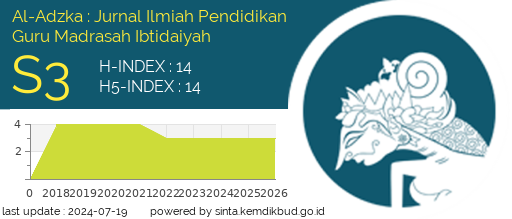PENERAPAN STRATEGI POINT COUNTERPOINT PADA PEMBELAJARAN PKn KELAS V DI MIN 13 BANJAR KABUPATEN BANJAR
DOI:
https://doi.org/10.18592/aladzkapgmi.v7i1.2024Keywords:
Point-Counterpoint Strategy, Civic LearningAbstract
This study aims to determine the implementation of Point-Counterpoint strategy on learning VII C grade in MIN 13 Banjar District and the factors that influence the implementation of counterpoint strategy on learning VII C grade in MIN 13 Banjar District. Subject in the study was 1 teacher of civic education subject. Data collection techniques used in this study observation, interviews, and study documents. The data processing techniques used data reduction, data presentation, and data verification. Data that has been processed and interpreted then analyzed to descriptive qualitative. After that in taking the conclusion the author took the inductive method of conclusions that are specific to the general conclusions. From the results of this study can be concluded that the implementation of Point-Counteroint strategy on learning VII C grade in MIN 13 Banjar Regency in general is well done with the making of the lesson plan (or RPP) where the RPP made by the teacher in accordance with the steps of Point-Counterpoint strategy and at the time of execution of teaching in accordance with steps of Point-Counterpoint strategy. This can be known from the teacher's educational background, teacher experience, and adequate facilities and infrastructure.References
Ahmadi, Abu. Strategi Belajar Mengajar. Bandung, CV Pustaka Setia, 2005
Al Jumanatul, Ali. Al-qur’an dan terjemahannya. Bandung, CV J-Art, 2005
Basrowi dan Suwandi. Memahami Penelitian Kualitatif. Jakarta, Rineka Cipta, 2008
Departemen Pendidikan Nasional. Kamus Besar Bahasa Indonesia. Jakarta, Balai Pustaka, 2001.
Dimyati dan Mudjiono. Belajar dan Pembelajaran. Jakarta, Rineka Cipta, 2006.
Djamarah, Syaiful Bahri. Guru Dan Anak Didik Dalam Interaksi Edukatif. Jakarta, PT Rineka Cipta, 2010.
Fathurrohman dan Wuri Wuryandani. Pembelajaran Pkn Di Sekolah Dasar. Yogyakarta, Nuha Litera, 2011.
Hadi, Amirul dan Haryono. Metode Penelitian Pendidikan. Bandung, Pustaka Setia, 2005.
Herhyanto, Nar dan M. Akib Hamid. Statiska Dasar. Jakarta, Universitas Terbuka, 2007.
Kunandar. Guru Profesional Implementasi Kurikulum Tingkat Satuan Pendidikan (KTSP) dan Sukses dalam Sertifikasi Guru. Jakarta, Rajawali Pers, 2010.
Majid, Abdul. Perencanaan Pembelajaran. Bandung, PT Remaja Rosdakarya, 2011.
Marno dan M.Idris. Strategi dan Metode Pengajaran. Yogyakarta, Ar-Ruz Media, 2008.
Margono, S. Metodologi Penelitian Pendidikan. Jakarta, Rineka Cipta, 2004.
Mulyana, Rohmat.. Mengartikulasikan Pendidikan Nilai. Bandung, Alfabeta, 2011.
Mulyasa. Implementasi Kurikulum Tingkat Satuan Pendidikan Kemandirian Guru dan Kepala Sekolah. Jakarta, Bumi Aksara, 2009.
Munawir, Ahmad Warsam. Kamus Al-Munawir Arab Indonesia. Surabaya, Pustaka Progresif 1997.
Saefudin, Asis. Pembelajaran Efektif. Bandung, PT Remaja Rosdakarya, 2014.
Sugiono. Metode Penelitian Pendidikan Pendidikan Pendekatan Kuantitatif, Kualitatif, dan R&D. Bandung, Alfabeta, 2010.
Sukmadinata, Nana Syaodih. Metodologi Penelitian. Bandung, PT. Remaja Rosdakarya, 2010
Pengembangan Kurikulum. Bandung, Remaja Rosdakarya, 2012.
Uno, Hamzah B. Perencanaan Pembelajaran. Gorontalo, Sinar Grafika Offset, 2006.
Usman, Moh Uzer. Menjadi Guru Profesional Edisi Kedua. Bandung, PT Remaja Rosdakarya, 2011.
Zaini, Hisyam. dkk. Strategi Pembelajaran Aktif. Yogyakarta, CTSD, 2007.
https://www.google.com/amp/s/akhmadsudrajat.wordpress.com//2009/05/26/standar-pelaksanaan-proses-pembelajaran/amp/?=ms-operamobile&espv=1.diakses pada tanggal 24 november 2016, jam 14.33 WITA
https://ayulaksmini.wordpress.com/materi-kuliah/pendidikan-pkn-sd/ pada tanggal 28 desember 2016, jam 09.30 WITA
http://lagibelajargoblog.blogspot.co.id/2014/12/kriteria-dan-konsep-penyusunan.html?m=1. Diakses pada tanggal 17 juli 2017, jam 11.01 WITA
Downloads
Published
How to Cite
Issue
Section
License
Copyright (c) 2018 Alya Soraya Isnani

This work is licensed under a Creative Commons Attribution 4.0 International License.
Authors who publish with this journal agree to the following terms:
- Authors retain copyright and grant the journal right of first publication with the work simultaneously licensed under a Creative Commons Attribution 4.0 International that allows others to share the work with an acknowledgement of the work's authorship and initial publication in this journal.
- Authors are able to enter into separate, additional contractual arrangements for the non-exclusive distribution of the journal's published version of the work (e.g., post it to an institutional repository or publish it in a book), with an acknowledgement of its initial publication in this journal.
- Authors are permitted and encouraged to post their work online (e.g., in institutional repositories or on their website) prior to and during the submission process, as it can lead to productive exchanges, as well as earlier and greater citation of published work.








